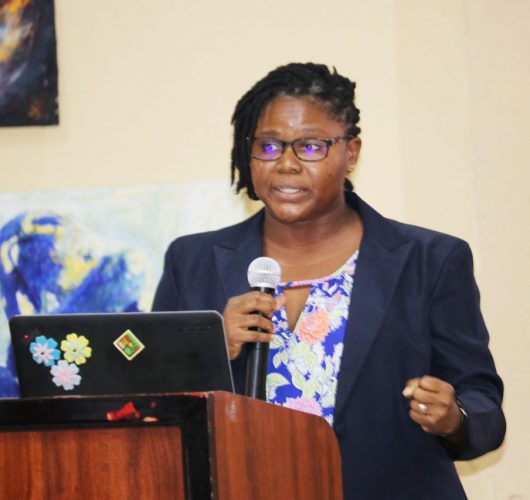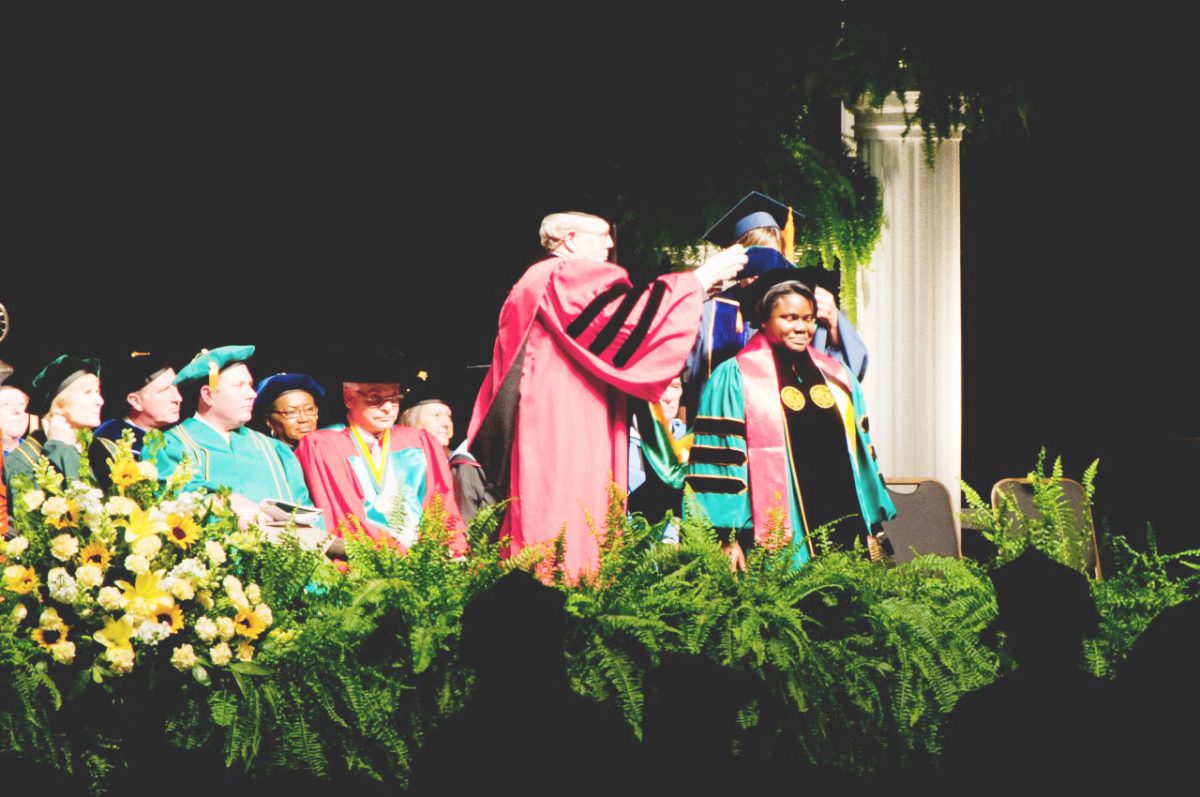Dr Dawn Fox developed a love affair with Chemistry in secondary school, which has flourished as she now lecturers in the field, has done tons of research and if all goes well will soon produce a household water filter made entirely from recycled and locally available materials, which can be deployed in vulnerable communities and emergency situations.
Dr Fox, who has been at the University of Guyana for many years and currently is a senior lecturer in the Department of Chemistry, has overarching research interest in converting local materials, especially waste, to solve environmental problems.
Over the years her research has looked at cleaning up dirty water and her laboratory is referred to as the “trash to treasure lab” where waste material is treated and chemically modified to make sorbents that can remove pollutants from water.

A signature project is the water filter, which was funded by the University of Guyana Science and Technology Support Programme through a grant in the sum of US$21,817. The funding also catered for the retooling and refurbishing of the labs. It was a competitive process to get the funding for the project, which involves building a low-cost water filter for households. Everything that makes the filter is found locally and it starts with the casing, which is just a regular plastic bottle. Inside of the filter are the materials that are going to remove the contaminants.
“It is all local. It is all found in Guyana and all of the different components remove different contaminants from water,” she said of the project.
So far, it has been tested on a few of the water quality parameters and it performed well, but more work needs to be done on it before people can actually drink the water it has filtered.
To further the work, Dr Fox explained, she has to find a student interested in working on it and she also needs the lab, but COVID-19 has reduced access to that facility.
“That project is still very much alive, but we have to see how best we can return to the lab so that I can do the rest of the testing,” she shared.
Should the filter become a reality, it can be used in emergencies to supply clean water or where there is no access to secondary treatment to produce high quality drinking water. The filter can be used in droughts to clean up a source of water to make it drinkable. It does not need any electricity and can be easily assembled since all the materials are locally available. She pointed out that in natural disasters one of the first things to go is power and access to safe drinking water becomes a challenge; this is where the filter can be beneficial.
The concept is for it to be distributed through a public assistance process at the community level. But first she wants to ensure that all the materials pass all the tests and meet certain standards and then she will approach partners to ascertain who needs it and find ways for them to access same.
No life without Chemistry
Dr Fox relates that it was one teacher in fourth form in secondary school who led her down her current path as while she toyed with other career options, the manner in which chemistry was delivered by the teacher had her hooked.
“I met my Chemistry teacher Mrs Grace Henry, and that was it. After her being in her class I couldn’t see a life without Chemistry. … She actually made me fall in love with Chemistry. I like to reason things out and in Chemistry you can arrive at a position by using logic and just going through the things that made sense,” Dr Fox said in a recent conversation with Stabroek Weekend.
“So that’s where it actually started. The science journey started formally with her,” she said, labelling Mrs Henry as “one phenomenal teacher”. But credit is also due to her mom for encouraging her to be whatever she wanted even though no one in her family took to science. Both of her parents are deceased, but her dad was in communications and her mom was a confidential secretary for many years.
Before she properly started her science journey, she was a junior reporter with the publication Business Monthly, which was published by then mentor, Leon Walcott. She said the experience was invaluable as it assisted her in writing up her reports when she commenced her Chemistry degree.
Her love affair with Chemistry continued at the university and it became even sweeter as she “found her tribe” in other Chemistry students who were all likeminded.
Dr Fox secured a bachelor’s degree in Chemistry from the University of Guyana and through a Commonwealth scholarship, she graduated with a master’s degree in Chemical and Materials Engineering from the University of Auckland in New Zealand. She also has a post-graduate Diploma in Education from UG and a Doctor of Philosophy degree in Chemical Engineering from the University of South Florida, in the USA.
‘A home for me’
Dr Fox has not really left the University of Guyana since she started as a freshman many years ago and she described it as a “home for me. I feel like I never really left. I mean, I did leave to go and study and so, but I always returned…” After her first degree, she joined the staff as an assistant lecturer.
Perhaps she did not choose UG but rather it chose her as she spent one year following her first graduation looking for a job, as while she had excellent grades she had no working experience which was required. With advice from a mentor, she first did an internship at the Institute of Applied Science and Technology (IAST) for about six months and then she became a staff member at UG.
“It never occurred to me to think of myself working or studying anywhere else. I always considered it because you know the grass always looks green on the other side but in my vision of my life it was always to come back and work here and to serve here,” she expounded.
Dr Fox said she is humbled to play a part in moulding Guyana’s future scientists and leaders as she sees it as the most important responsibility that could be given to anyone to “say I am putting in your hands the people who are going to take over tomorrow and the next day…”
She said more important than any scientific contribution she can ever make is helping to mould another Guyanese chemist and she takes teaching as the highest honour of her lifetime.
“Actually I am blown away sometimes because I remember as a student I held all my lecturers in such high estimation, I still do… I have a debt of gratitude for them and so I am blown away now because it is possible I could actually take their place. But that is the cycle of life, they invested in me so I could now invest in others and that’s how we keep it going,” was how she summed it up.
Being a faculty member Dr Fox has three primary tasks she is expected to fulfil: teaching, research and service. As part of the students’ curriculum to graduate they need to do research and so “it is a win-win situation”, she said, as while she is teaching them to do research they are also assisting her with her research projects.
Apart from the filter project, which is ongoing, Dr Fox is working on making low-cost activated carbon using natural material like sawdust and coconut shells, which are treated chemically and with heat.
She clarified that it is not going to be at the level of the commercial activated carbons, but she is trying to use more environmentally-friendly chemicals and low energy to try to make a product that is going to do the same and therefore she is continuing to experiment with different processes and different waste materials.
Dr Fox is very attached to UG; she believes that is where she can make a contribution and she is happy to serve.
The institution takes a beating from to time, and Dr Fox said while there is room for improvement, “if we all just keep bad talking it, it is not going to go anywhere. This is the only national university and in my short time I have seen the university grow in leaps and bounds.
“Yes I hear it. I hear the bad talk. I hear the criticisms, some of them are fairly levelled at us, but I also see the potential. I see the people who are here, the people who show up here to make the place better and I want to be a part of this team because I know we can do this. We can make it better.”
WiSE
Over the years, Dr Fox has not allowed her contribution to be limited to lecturing and research. In 2016 a group of chemists concluded that most women, especially those who are in male-dominated fields, have some struggles balancing home life and work life and progressing professionally.
They realised that there was a need and there might be benefit in coming together as women in science and engineering to see what their needs are and how best to address them.
“The commonalty is that we want to strive. We love our profession. We are grateful to be part of it, but we want to flourish in it, and we want to see what are some of the ways that we would overcome challenges…,” she said, adding for all working women, childcare is extremely important.
They knew among themselves they had solutions to some of the problems, but they needed to come together so Dr Fox and another colleague, Dr Keisha Holder and her mom, co-founded Women in Science & Engineering (WiSE-GY), which was launched in April 2016.
The group resonated with many and involved coaching young girls on their professional path, encouraging those who might be intimidated to consider traditionally male-dominated careers and empowering the current professionals to grow in their professions.
“We have been growing in fits and starts and COVID didn’t help things… it has never been dormant, but it is not as formalized as we thought it would have been by now. But the core unit is still there; the people who are interested we are still there and maybe it is a bit informal, but we do provide that sort of support,” she said of the group.
She said WiSE is here to stay as the community needs that support which was brought to bear with the emergence of COVID-19 as the fallout showed that one needs support of one’s colleagues to navigate various challenges.
Dr Fox grew up in Bartica. Back then she said, it was a “child’s fantasy world”. Her favourite memories involve bathing in the river. She also spoke glowingly about the endless fruit trees that were available and even after the family moved to Georgetown for her to attend secondary school, she is the eldest of three, they still returned to spend happy holidays.
“It is still the best part of my childhood memories, climbing trees even and straight with my brother and cousin and running up and down in the yard. Of course, no television, no internet, no tablets so play was really playing outdoors,” she reminisced.




